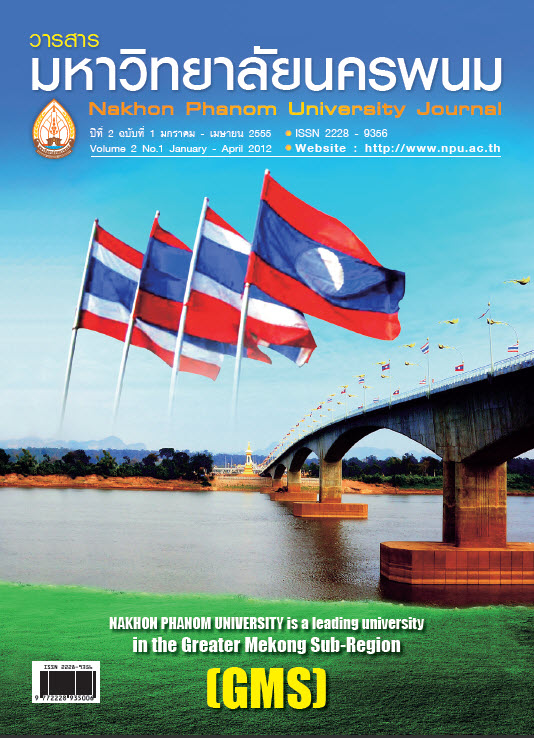การเปรียบเทียบผลการเรียนรู้วิทยาศาสตร์ เรื่องสารชีวโมเลกุล ชั้นมัธยมศึกษาปีที่ 4ระหว่างการจัดการเรียนรู้ด้วยกลุ่มร่วมมือแบบ STAD และแบบสืบเสาะหาความรู้
Main Article Content
Abstract
การวิจัยครั้งนี้มีวัตถุประสงค์เพื่อหาประสิทธิภาพและดัชนีประสิทธิผลของแผนการจัดการเรียนรู้ด้วยกลุ่มร่วมมือแบบ STAD และแบบสืบเสาะหาความรู้ เปรียบเทียบผลการเรียนรู้ระหว่างการเรียนด้วยกลุ่มร่วมมือแบบ STAD และแบบสืบเสาะหาความรู้ และ เปรียบเทียบความพึงพอใจในการเรียนรู้ด้วยกลุ่มร่วมมือแบบ STAD และแบบสืบเสาะหาความรู้ ประชากรเป็นนักเรียนชั้นมัธยมศึกษาปีที่ 4 ภาคเรียนที่ 1 ปีการศึกษา 2554 โรงเรียนค้อวิทยาคม อำเภอโพนสวรรค์ จังหวัดนครพนมจำนวน 4 ห้อง กลุ่มตัวอย่างที่ใช้ในการวิจัยเป็นนักเรียนชั้นมัธยมศึกษาปีที่ 4 จำนวน 2 ห้อง ห้องที่ 1 จำนวน 35 คน เรียนด้วยกลุ่มร่วมมือแบบ STAD และห้องที่ 2จำนวน 35 คน เรียนด้วยแบบสืบเสาะหาความรู้ซึ่งได้มาโดยการสุ่มแบบกลุ่ม (Cluster Random Sampling) เครื่องมือที่ใช้มี 4 ชนิด คือแผนการจัดการเรียนรู้ เรื่องสารชีวโมเลกุลด้วยกลุ่มร่วมมือแบบ STAD และแบบสืบเสาะหาความรู้ วิธีละ 10 แผน แบบทดสอบ วัดผลสัมฤทธิ์ทางการเรียนชนิดเลือกตอบ 4 ตัวเลือก จำนวน 40 ข้อ มีค่าอำนาจจำแนกตั้งแต่ 0.26 ถึง 0.57 และค่าความเชื่อมั่น เท่ากับ 0.93 แบบประเมินพฤติกรรมการทำงานกลุ่ม และแบบสอบถามความพึงพอใจในการเรียน การวิเคราะห์ข้อมูลใช้สถิติร้อยละ ค่าเฉลี่ยส่วนเบี่ยงเบนมาตรฐานและ t-test (Independent Samples) ผลการวิจัยปรากฏดังนี้ 1) แผนการจัดการเรียนรู้กลุ่มสาระ การเรียนรู้วิทยาศาสตร์ ชั้นมัธยมศึกษาปีที่ 4 เรื่องสารชีวโมเลกุล ด้วยกลุ่มร่วมมือแบบ STAD มีประสิทธิภาพ เท่ากับ 78.30/71.28 และแผนการจัดการเรียนรู้แบบสืบเสาะหาความรู้มีประสิทธิภาพเท่ากับ 76.71/70.07 ซึ่งสูงกว่าเกณฑ์ที่กำหนดไว้ 2) ดัชนีประสิทธิผล ของแผนการจัดการเรียนรู้กลุ่มสาระการเรียนรู้วิทยาศาสตร์ ชั้นมัธยมศึกษาปีที่ 4 เรื่องสารชีวโมเลกุล ด้วยกลุ่มร่วมมือแบบ STAD เท่ากับ 0.5897 คิดเป็นร้อยละ 58.97 และแผนการจัดการเรียนรู้แบบสืบเสาะหาความรู้ เท่ากับ 0.5814 คิดเป็นร้อยละ 58.14 3) นักเรียนที่เรียนด้วยกลุ่มร่วมมือแบบ STAD มีผลสัมฤทธิ์ทางการเรียนหลังเรียนสูงกว่านักเรียนที่เรียนแบบสืบเสาะหาความรู้ อย่างมีนัยสำคัญทางสถิติที่ระดับ .01 4) การศึกษาความพึงพอใจของนักเรียนที่เรียนด้วยกลุ่มร่วมมือแบบ STAD และแบบสืบเสาะหาความรู้มีความพึงพอใจในระดับปานกลาง
The purposes of this study were 1) to find out efficiency and effectiveness indices of learning plan using STAD technique and Inquiry approach, 2) to examine and compare learning outcomes between STAD technique and Inquiry approach and 3) to investigate the satisfaction of learning using STAD technique and Inquiry approach. The samples in this research were Matthayomsuksa 4 students, consisted of 2 classrooms of students attended Khowittayakhom School, Phonsawan District, NakhonPhanom Province in the first semester of academic year 2011. The first classroom consisted of 35 students learned with STAD technique and the second one consisted of 35 students learned with Inquiry method, obtained from Cluster Random Sampling. Four types of the instruments used were learning plan on Biomolecule using STAD technique and Inquiry method; 10-plan, 4-choice and 40-item achievement test with the discrimination between 0.26-0.57 and the reliability of 0.93; an evaluation form on group working behavior; a learning satisfaction questionnaire. The collected data were analyzed by percentage, mean, standard deviation and t-test (Independent Samples). The results were as follows: 1) The learning plan on title “Biomolecule” in science subject area of Matthayomsuksa 4 using STAD technique revealed higher efficiency of 78.30/71.28 and Inquiry approach revealed higher efficiency of 76.71/70.07, 2) The effectiveness indices on title “Biomolecule” in science subject area of Matthayomsuksa 4 using STAD technique revealed 0.5897 or 58.97 percent and Inquiry approach revealed 0.5814 or 58.14 percent, 3) The students learned with STAD technique had higher achievement after learning than the ones learned with Inquiry approach significantly different at .01 level,and 4) The students learned with STAD technique revealed higher learning achievement than the ones learned with Inquiry approach significantly different at .01 level.In conclusion, the students learned with STAD technique revealed higher effectiveness development in learning achievement and learning satisfaction than the students learned with Inquiry approach. Therefore, science teachers should support and continue both implications in science learning and instruction.


